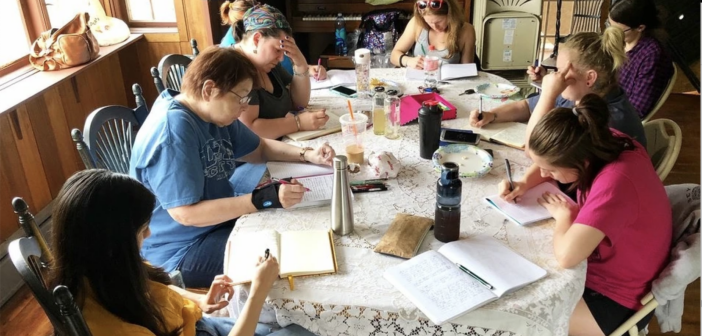For combat veteran and Bethlehem resident Jenny Pacanowski, “Thank you for your service,” is not preferred.
In 2003, at age 23, Pacanowski was deployed to Iraq as a first responder for convoys on the front lines. She said Iraqi guerrilla warfare tactics made it difficult to distinguish between insurgents and civilians.
“A lot of innocent people got hurt,” she said. “So, when people thank me for my service, I’m like, ‘Oh, they’re thanking me for hurting innocent people.’ So that’s how it hits.”
When she returned from her service to her hometown in the Poconos in 2007, Pacanowski struggled to understand her psyche. She said she didn’t feel like herself. Her internal battle continued for seven years.
“I just wanted someone to explain what was going on with me because I was already exhibiting symptoms of post-traumatic stress (disorder),” she said. “Back in that time, nobody even knew that language.”
After moving to the Lehigh Valley in 2013, Pacanowksi was desperate to find community. She soon discovered the lack of veterans groups for females, artists and writers in the area.
So, she decided to start her own.
Pacanowski is now the director for Women Veterans Empowered and Thriving, a Bethlehem-based reintegration program that uses writing and performance to enable women veterans to share their stories.
Pacanowski said creating a space for women veterans was especially important. She found, within this space, many women veterans were dealing with a particular form of post-traumatic stress: military sexual trauma (MST).
According to the U.S. Department of Veterans Affairs, MST refers to sexual assault or sexual harassment experienced during military service, including any sexual activity in which soldiers are involved against their will or unable to say no.
One in three women veterans who seek Veterans Affair health care report experiencing MST.
“They don’t want to walk into a room full of male veterans and have to deal with that kind of dynamic again,” Pacanowski said. “Having a women-only space is something that I felt I was called to do.”
Swept Under the Rug
Christopher Yarnell, president of the veteran non-profit organization BattleBorne, said MST is a topic that is often undiscussed.
“Military sexual trauma is huge,” Yarnell said. “Nobody wants to touch it. Nobody wants to talk about it. People want to sweep it under the rug because the military frowns upon it.”
Alex Carrillo, director for the Northampton County Veterans Affairs Office and a Veteran Service Officer, agreed that many veterans don’t feel comfortable disclosing their trauma.
“It is a sensitive topic to discuss obviously, it’s delicate,” he said. “My experience with veterans is that they do not like to talk about it, or that they are embarrassed to talk about it.”
Carrillo’s primary duty as a service officer is to assist veterans, their spouses or family members in applying for benefits they may be eligible to receive.
He said if veterans are experiencing mental health issues such as anxiety, depression or eating disorders as a result of MST, they can file for compensation.
Yet, the process may not be that simple for some veterans.
“If they come to me looking to file for a claim because this happened to them, it takes a while to build that trust so that they’re comfortable even coming forward to make that claim or to ask for help,” Carrillo said.
Because many veterans have trouble discussing MST to obtain personal benefits, Carrillo said, it can create a barrier to connecting them with resources.
He said it is ultimately up to the individual veteran to build up the courage and become educated about the benefits available to them, such as therapy or a compensation claim.
Yarnell said that he has worked with veterans who have been discharged for reporting MST during their service.
“Often, it doesn’t get handled,” he said. “If you do report it, there can be retaliation.”
Opening Wounds
Yarnell said he believes MST must be handled by clinical professionals. He said sending a veteran home after a peer-to-peer program can be dangerous and could add to the veteran suicide rate.
According to the 2022 National Veteran Suicide Prevention Annual Report, the suicide rate for veterans is 57.3% greater than for non-veterans in the United States.
“You are opening people’s wounds, and you better have someone there that can counsel and console them, besides, like, ‘Hey, thanks for sharing with me. I’ll see you next month at our group,’” Yarnell said.
Pacanowski agrees.
Women Veterans Empowered and Thriving conducts empowerment workshops, performances, panel discussions and public speaking forums, many of which take place at the Banana Factory Arts Center and Touchstone Theater in South Bethlehem, or virtually on Zoom. But, Pacanowski said her program is more than just a conversation between peers.
“We don’t just sit around and talk like a support group,” she said. “We have very specific intentions, skills that we teach and goals that we strive for when we’re in the empowerment workshop.”
She said her organization offers programs for men, as well, after many men veterans expressed interest in participating.
A United States Deparment of Defense Annual Report on Sexual Assault in the Military for year 2021 said women reported sexual assault at about three times the rate that men did.
Yarnell said more support for veterans who have MST is long overdue, but there has been little initiative because of the risk.
“It’s not easy,” he said. “You’re not taking some vets to a Phillies game. You’re talking about having them open up wounds they don’t want to deal with, but they either deal with it or it deals with them.”
As a result, BattleBorne is launching a free 12-week program for victims of MST.
The first three weeks of the program will consist of MST education, including its prevalence and symptoms. The rest of the program is trauma focused, using holistic approaches such as art therapy, writing, yoga and nutrition counseling. The final weeks of the program connect female veterans to other resources if they seek further recovery.
A Secure Place
Though MST healing was not the original mission of Pacanowski’s organization, she said it became a secure place where those who did want to speak on the topic felt comfortable doing so.
She said she is intentional about calling the program’s space “secure,” as opposed to using the word “safe,” since the word safety may not carry the same connotation from one veteran to the next.
“We secure this space to the best of our ability, hoping that it will bring you to a sense of safety within yourself,” Pacanowski said.
Many women in Pacanowski’s program have courageously shared their stories, she said. Still, there are veterans who are reluctant to tell others about their experience.
Isolation is the main thing that kills veterans, Pacanowski said. Therefore, her program isn’t just an activity veterans can attend, but a place where they can develop skills necessary to support themselves in times of solitude.
“When they’re alone, that’s when they need those skills that we teach,” Pacanowksi said. “How to value yourself, how to empower yourself, how to make sure that you have that will to live or at least giving you enough time to reach out to someone.”
Through her work, Pacanowski said she has found some purpose and peace after her service.
There are 65-year-old women in Pacanowski’s group who are being thanked for their service for the first time. She said many of them — who were not recognized in the 1960s, 70s and 80s — enjoy it.
Personally, Pacanowski said she would rather hear “welcome home.”
“I have a complicated relationship with my service,” she said. “So being thanked for it is kind of weird.”
She hopes to unite veterans through their common struggle, regardless of their sentiments towards the military.
“It’s not comparing our experiences, it’s finding the similarities between each person,” she said. “The short version of why I started (Women Veterans Empowered and Thriving) was because I didn’t want to leave people to suffer like I did.”






Comment policy
Comments posted to The Brown and White website are reviewed by a moderator before being approved. Incendiary speech or harassing language, including comments targeted at individuals, may be deemed unacceptable and not published. Spam and other soliciting will also be declined.
The Brown and White also reserves the right to not publish entirely anonymous comments.